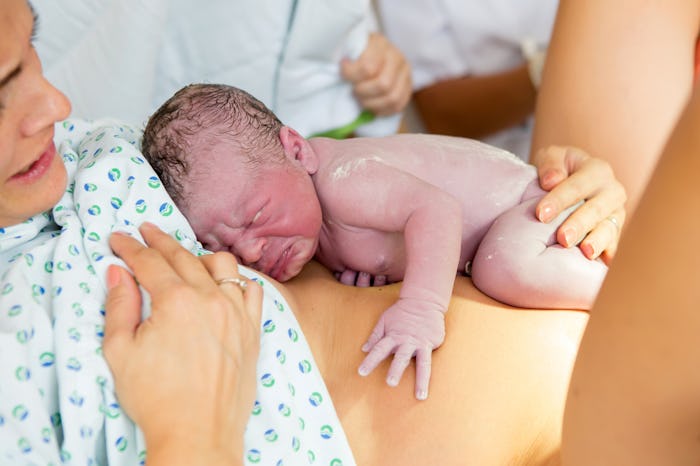Life

What Happens In Those Critical Few Minutes Right After Your Baby Is Born
Finally getting to meet someone after months of wondering, imagining, and dreaming is a powerful thing. Your baby's first breath? First cry? I get mushy just thinking about it. Just like there are protocols to keep you healthy and safe, however, hospitals have protocols for brand new babies, too. Doctors need to check and log crucial stats, and may interrupt your blissful cuddling with a few necessary tests. So you're not taken by surprise on a special day, it's nice to know what happens to the baby right after they're born.
"Birth is an incredible change for a baby," explains Dr. Jarret Patton MD, FAAP, in an email to Romper. "While the baby is in the womb, the mother does the eating, drinking, breathing, peeing, and pooping for the baby. Immediately after birth, the baby must learn to breathe air [while inside you, their lungs were filled with fluid]." According to Parents, your baby is likely to get a little help with that breathing thing — within the first five minutes, doctors will suction baby's mouth and nose. Next, the doctor will clamp the umbilical cord, and administer your baby's very first standardized test, known as the APGAR.
Patton explains that the APGAR considers "the baby's breathing, heart rate, reflexes, muscle tone, and color," which are all indicative of health. APGAR scores run from zero to 10, but anything over seven is good news, noted Parents. Nurses will also quickly take your baby's first weight while you deliver the placenta.
So when do you get to hold your little one?
"Many hospitals and birthing centers get the baby to mom as quickly as possible," explains Patton, because early skin-to-skin contact helps keep the baby warm, and is an important step in the establishment of breastfeeding. After I gave birth, I was left alone for "magic hour" with my new family, and I appreciated the nurses giving me that private moment to hold my baby. I felt like she was getting to know my scent, my heartbeat, and I was getting to know her. Enjoy that time, because after magic hour, you're unlikely to be left alone for long.
"The baby is checked often during the first 24 hours," explains Patton. "Nurses and doctors monitor for any changes in breathing, color, or activity from the baby. They also determine when the baby has its first urination and stool." As for shots, your baby should get a vitamin K injection on day one to prevent a "deadly bleeding condition," but the hospital will likely hold off on Hepatitis B until the next day.
Of course, this timeline assumes your baby is born healthy and at term. You might have to put off magic hour if your baby has a low APGAR score, or any trouble breathing after birth. Premature babies will also head to the NICU before being handed to you, according to Parents, because preemies need vitals taken every 30 minutes.
In the hours after your baby's birth, hospital staff work through a fairly extensive checklist to make sure your baby has the best start in life. But don't worry, you'll have plenty to do yourself. If you choose to breastfeed, you'll be learning the ins and outs of nursing within hours of birth. You'll also learn to swaddle your baby — likely in the middle of the night, when your brain is barely functioning — and practice responding to your baby's first restive cries.
A lot happens immediately after baby is born, and for me, it was a bit of a blur. Nevertheless, I was extremely glad that the nurses and doctors knew what they were doing, and that protocols like the APGAR existed to keep my newborn from harm. The hospital ran like a well-oiled machine as soon as my baby made her entrance, and before I knew it, I was cuddling her in the car and imagining our new life together as we drove home.
Check out Romper's new video series, Romper's Doula Diaries:
Check out the entire Romper's Doula Diaries series and other videos on Facebook and the Bustle app across Apple TV, Roku, and Amazon Fire TV.